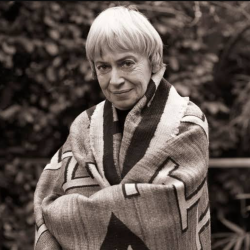
Ursula K. Le Guin
| Date of Birth | : | 21 Oct, 1929 |
| Date of Death | : | 22 Jan, 2018 |
| Place of Birth | : | Berkeley, California, United States |
| Profession | : | Author, Poet, Novelist |
| Nationality | : | American |
Ursula Kroeber Le Guin was an American author best known for her works of speculative fiction, including science fiction works set in her Hainish universe, and the Earthsea fantasy series.
Biography
Le Guin, the daughter of distinguished anthropologist A.L. Kroeber and writer Theodora Kroeber, attended Radcliffe College (B.A., 1951) and Columbia University (M.A., 1952). The methods of anthropology influenced her science-fiction stories, which often feature highly detailed descriptions of alien societies. Her first three novels, Rocannon’s World (1966), Planet of Exile (1966), and City of Illusions (1967), introduce beings from the planet Hain, who established human life on habitable planets, including Earth. Although her Earthsea series—A Wizard of Earthsea (1968), The Tombs of Atuan (1971), The Farthest Shore (1972), Tehanu (1990), Tales from Earthsea (2001), and The Other Wind (2001)—was written for children, Le Guin’s skillful writing and acute perceptions attracted a large adult readership. She tapped the young adult market again with her Annals of the Western Shore series, which includes Gifts (2004), Voices (2006), and Powers (2007). Le Guin also wrote a series of books about cats with wings; the series included Catwings Return and Jane on Her Own, both published in 1999.
Le Guin’s most philosophically significant novels exhibit the same attention to detail that characterizes her science fiction and high fantasy works. The Left Hand of Darkness (1969) is about a race of androgynous people who may become either male or female. In The Dispossessed (1974), she examined two neighbouring worlds that are home to antithetical societies, one capitalist, the other anarchic, both of which stifle freedom in particular ways. The destruction of indigenous peoples on a planet colonized by Earth is the focus of The Word for World Is Forest (1972). Always Coming Home (1985) concerns the Kesh, survivors of nuclear war in California, and includes poetry, prose, legends, autobiography, and a tape recording of Kesh music. In 2008 Le Guin made literary news with Lavinia, a metatextual examination of a minor character from Virgil’s Aeneid and her role in the historical development of early Rome.
Le Guin also wrote many essays on fantasy fiction, feminist issues, writing, and other topics, some of them collected in The Language of the Night (1979), Dancing at the Edge of the World (1989), Steering the Craft (1998), The Wave in the Mind (2004), and Words Are My Matter (2016). No Time to Spare: Thinking About What Matters (2017) is a selection of personal essays that originally appeared on her blog. Le Guin’s volumes of poetry included Wild Angels (1975), Wild Oats and Fireweed (1988), Going Out with Peacocks, and Other Poems (1994), Incredible Good Fortune (2006), and Finding My Elegy: New and Selected Poems 1960–2010 (2012).
In 2000 she was awarded the Living Legend medal by the Library of Congress.
Quotes
To see that your life is a story while you're in the middle of living it may be a help to living it well.
What sane person could live in this world and not be crazy?
When you light a candle, you also cast a shadow.
Belief is the wound that knowledge heals.
To have a choice at all is to be privileged.
All of us have to learn how to invent our lives , make them up, imagine them. We need to be taught these skills; we need guides to show us how. If we don't, our lives get made up for us by other people .
Our roots are in the dark; the earth is our country. Why did we look up for blessing -- instead of around, and down? What hope we have lies there. Not in the sky full of orbiting spy-eyes and weaponry, but in the earth we have looked down upon. Not from above, but from below. Not in the light that blinds, but in the dark that nourishes, where human beings grow human souls.
What goes too long unchanged destroys itself.
Love doesn't just sit there, like a stone; it has to be made, like bread, remade all the time, made new.
All knowledge is local, all truth is partial. No truth can make another truth untrue. All knowledge is part of the whole knowledge. Once you have seen the larger pattern, you cannot go back to seeing the part as the whole.
